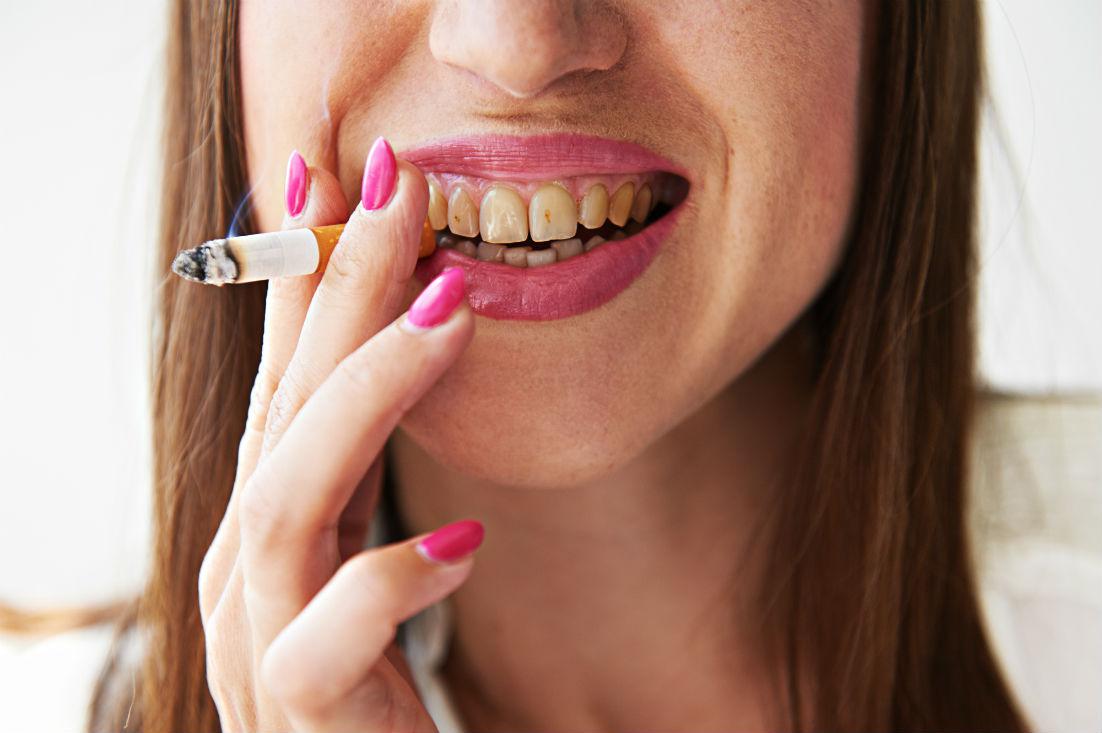 14 of every 100 individuals age eighteen and over smoke in the United States, according to a 2017 Center for Disease Control report. This means 14% of America is lighting up!
14 of every 100 individuals age eighteen and over smoke in the United States, according to a 2017 Center for Disease Control report. This means 14% of America is lighting up!
The Surgeon General has been warning people for decades, emphasizing that smoking is bad for your health. But what makes it bad for you? And in particular, what does smoking do to your teeth?
You're most likely aware of how smoking affects your lungs, but the effects of smoking begin with your mouth.
What Does Smoking Do to Your Teeth?
Your mouth is the first point of entry in your body. When you light up a cigarette and exhale that first puff, you most likely aren't thinking about how a cigarette will affect your teeth. Cigarette smoking affects both the appearance and health of your teeth overall.
Tooth Discoloration
If you smoke a pack of cigarettes a day, you are giving up the possibility of maintaining naturally white teeth. It is important to visualize your teeth like a porcelain vase. Essentially, the enamel of your teeth acts just like a porcelain finish, with fine cracks. As you age and use your teeth for several decades, those cracks absorb what you put in your mouth.
When you smoke a cigarette, the nicotine and tar in the cigarette will seep into the cracks and become a fixture there. You cannot brush them away. Stained teeth result from more than just poor brushing habits. You will also experience a build-up of plaque and tartar on your teeth because of the nicotine and tar in the cigarette.
If you're a chronic smoker, you will require teeth whitening to maintain a pearly white smile.
How Does Smoking Contribute to Tooth Loss?
There are several reasons you have a decreased chance of preserving your original teeth if you're a chronic smoker.
Delayed Healing Process
Smoking tobacco reduces the oxygen in your bloodstream. It is important to remember that oxygen is necessary for healing processes in your body. When you experience oral disease or dental conditions that require surgical procedures (tooth extractions, dental implants, root canals, etc), this means a chronic smoker will heal more slowly and face a longer recovery time. Smokers are also at a higher risk of infection, because your gums may not be able to heal properly.
Increased Chance of Gum Disease
Gum disease is one of the most common reasons for tooth loss in adults, and smoking is a major contributing factor. Gum disease progresses faster in chronic smokers. As a result, smokers typically not only lose their teeth, but dental implant procedures are less successful with them than with a non-smoker.
Progression of Gum Disease
Whether you smoke or not, it is important to remember that gum disease begins with bacterial growth in your mouth. Some people are genetically more susceptible to gum disease, but smoking will increase your chances because you're introducing bacteria regularly with a cigarette. As you smoke, plaque begins to build up and bacteria increases. Your gums become inflamed, and you may notice more blood on your toothbrush or in your saliva when you brush your teeth.
This is the start of gingivitis, a common gum disease. When you don't receive proper treatment for your gingivitis, the gum disease then progresses to periodontitis. With periodontitis, the inner layer of the gum and bone begin to separate from the teeth. Pockets then form between the teeth and the gum. Bacteria begins to collect in those pockets, along with debris, and infection sets in. For a non-smoker, the immune system kicks in full strength at this time to fight the infection. However, a smoker has a compromised immune system, allowing the infection to spread and grow beneath the gum line.
Everything that holds your teeth in place, from the bone to the connective tissue, suffers at this point. The bacteria produce toxins that break down your bone and connective tissue. You may begin to notice loose teeth at this stage, as the bone and tissue are gradually destroyed. Your teeth have no anchor to keep them in place, and they often begin to fall out.
Cigarettes are the “smoking gun” of tooth loss. Teeth do not decay because of cigarettes, but everything that holds the teeth to your jaw does. Your body cannot fight off the infections that lead to this erosion because of its compromised immunity.
Signs of Gum Disease
If you're a chronic smoker, you should understand the signs of gum disease.
Gums pull away from teeth
Excessive bleeding during teeth brushing
Red and swollen gums
Loose teeth
Sensitive teeth
Painful chewing
It is important to keep an eye out for any of these symptoms and visit your dentist right away if they develop.
What If You Lose Your Teeth?
At this point, you may be thinking, "What's the big deal? I don't like my teeth that much, and I can always get implants if I lose a tooth."
This would be true if you were a non-smoker. However, it is important to remember that dental implants require a healthy jawbone. If you're losing your teeth because of eroding bone and tissue, you will not have a stable anchor for dental implants.
Furthermore, you will have a regularly changing jaw. This means you can look to obtain dentures, but you will require several regular fittings as your jaw shrinks.
What If You Can't Quit Smoking?
Smoking affects your teeth and your mouth. So why not just quit? If you have attempted to quit smoking multiple times and not succeeded, then look at the next best option. A commitment to reducing your quantity of daily smoking will dramatically improve your oral health and help save your teeth.
It is also important to plan on visiting your dentist regularly. They can help you find ways to fight gum disease that leads to tooth loss.
Drop the Smoke, Save Your Teeth
So, what does smoking do to your teeth? While smoking certainly has an adverse effect directly on your teeth, the most detrimental impact occurs to the oral structures (gums and jawbone) that hold your teeth in place.
If you desire to maintain your own teeth for a lifetime, stop lighting up! Contact our Downey practice if you're suffering from gum disease or any other oral health related issues.


